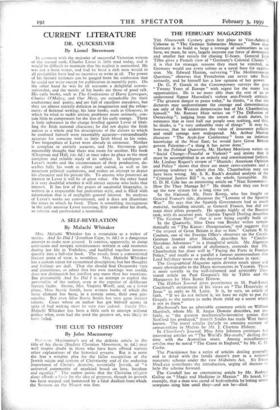CURRENT LITERATURE
In common with the majority of successful Victorian writers of the second rank, Charles Lever is little read today, and it would be difficult to maintain that his neglect is unmerited. He was not a born writer, and had he been a rich man would in all probability have had no incentive to write at all. The power of his literary instincts can be gauged from his confession that he could not write except for publication in monthly parts. On the other hand he was by all accounts a delightful conver- sationalist, and the merits of his books are those of good talk. His early books, such as The Confessions of Harry Lorrequer, Charles O'Malley, and Our Mess, are remarkable for their exuberance and gaiety, and are full of excellent anecdotes, but they are almost entirely deficient in imagination and the refine- ments of fictional writing; his later books, such as Glencore, in which he tried to tackle artistic problems more seriously, con- tain little to cornpeniate for the loss of his early energy. There is little substance in the charge levelled against Lever of libel- ling the Irish national character; he did not depict the Irish nation as a whole and his descriptions of the classes to which he confined himself were reasonably accurate—extraordinarily accurate for someone with so little Irish blood in his veins. Two biographies of Lever were already in existence. Neither is complete of entirely accurate, and Mr. Stevenson quite reasonably thought that there was room for another. His book (Chapman and Hall, I2S. 6d.) at once takes its place as the most complete and reliable study of its subject. It catalogues all Lever's works and the circumstances of their production, de- scribes fully his work as editor and consul, as well as his recurrent political aspirations, and makes an attempt to depict his character and his private life. To anyone who possesses an interest in Lever it will be of great value. On the other hand it is very doubtful whether it will attract anyone who lacks that interest. It has few of the graces of successful biography, is written in a respectable but pedestrian style, and is filled with information that is of negligible general interest. Its analyses of Lever's works are conventional, and it does not illuminate the times in which he lived. There is something incongruous in the gaily amateur Lever receiving, fifty years .after his death, so solemn and professional a memorial.










































 Previous page
Previous page